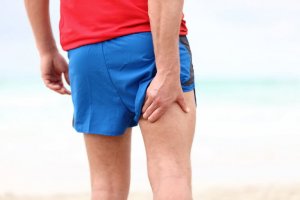All You Need to Know about Thigh Injuries

Upper leg injuries are common and can be debilitating. Since they play an important part in walking or running, this can really complicate everyday tasks. Today, we’ll take a closer look at thigh injuries.
The thighs
The thigh is the part of the leg between the hip and the knee. This part of your leg contains a large number of muscles with important functions, including:
- The quadriceps on the front.
- On the inside, the adductors.
- The hamstrings on the back.
- On the outside, the abductors.
This complicated network of muscles, along with the glutes, the iliopsoas, and the rotator cuffs, allows us to carry out all the leg movements for a normal life.
In this same area of the body, we also find the femur, the tendons of all the aforementioned muscles, and the ligaments. As you can see, it’s quite a complex structure, but sadly, it’s also prone to injury.
What causes thigh injuries?
Because of the large number of muscles in the thigh, the most common injuries are to the muscle tissue. Here are some of the most common ones:
Tears or micro-tears
Sudden or excessive use can cause some muscle fibers to break and stop working. Micro-tears are what we call ‘stiffness’ of the muscles. They normally recover in about two or three days, but during this time, you’ll normally experience some discomfort.

Tears, on the other hand, are different. In this case, you’ll feel as though the affected area has been hit with a heavy object. There are different degrees of tears, but, unlike a micro-tear, you’ll have more reduced functionality and probably inflammation and a painful bruise.
Strain: thigh injuries
A strain will normally occur during activities where the muscle is likely to suffer abrupt contractions and excessive stretching. This combination of forces normally happens during sports which require sudden movements, such as soccer or basketball.
In these cases, patients normally report a stinging sensation. Unlike a tear, because there are no broken fibers, there won’t be any bruising.
Contractures
Using a muscle for a long time without resting enough can cause muscle contractures. Your muscle will feel tight, be difficult to stretch, and painful to contract.
Cramps: thigh injuries
Cramps are when the muscle suddenly contracts due to a metabolic imbalance. If this happens, you’ll notice a sharp pain that subsides after stretching the affected muscle.
Shortening
Muscle shortening can cause other problems beyond just your legs. For example, it’s common for hamstrings to shorten due to not exercising them enough, not stretching them, or having poor posture. This shortening can cause the muscle to pull on the back of the pelvis, which in turn affects the lumbar curvature and can cause spinal problems.
Other possible causes of thigh injuries
As we’ve already mentioned, the thigh contains lots of complex structures. For example, it’s also possible to suffer from tendinitis (which will hurt when contracting a muscle) or a femur fracture (which will cause constant pain and reduced mobility).

Likewise, you might suffer from circulation problems because of the large presence of blood and lymphatic vessels in the thigh or nervous problems due to the large number of important nerves located there, such as the sciatic or femoral nerves.
If your thigh injury is obviously a muscle injury, you’ll need a mixture of rest, anti-inflammatories, and functional rehabilitation. On the other hand, if you have some other thigh injury, you’ll need a more precise diagnosis from a professional. If you have any doubts about your injuries, you should always see a doctor and get the right treatment.
Upper leg injuries are common and can be debilitating. Since they play an important part in walking or running, this can really complicate everyday tasks. Today, we’ll take a closer look at thigh injuries.
The thighs
The thigh is the part of the leg between the hip and the knee. This part of your leg contains a large number of muscles with important functions, including:
- The quadriceps on the front.
- On the inside, the adductors.
- The hamstrings on the back.
- On the outside, the abductors.
This complicated network of muscles, along with the glutes, the iliopsoas, and the rotator cuffs, allows us to carry out all the leg movements for a normal life.
In this same area of the body, we also find the femur, the tendons of all the aforementioned muscles, and the ligaments. As you can see, it’s quite a complex structure, but sadly, it’s also prone to injury.
What causes thigh injuries?
Because of the large number of muscles in the thigh, the most common injuries are to the muscle tissue. Here are some of the most common ones:
Tears or micro-tears
Sudden or excessive use can cause some muscle fibers to break and stop working. Micro-tears are what we call ‘stiffness’ of the muscles. They normally recover in about two or three days, but during this time, you’ll normally experience some discomfort.

Tears, on the other hand, are different. In this case, you’ll feel as though the affected area has been hit with a heavy object. There are different degrees of tears, but, unlike a micro-tear, you’ll have more reduced functionality and probably inflammation and a painful bruise.
Strain: thigh injuries
A strain will normally occur during activities where the muscle is likely to suffer abrupt contractions and excessive stretching. This combination of forces normally happens during sports which require sudden movements, such as soccer or basketball.
In these cases, patients normally report a stinging sensation. Unlike a tear, because there are no broken fibers, there won’t be any bruising.
Contractures
Using a muscle for a long time without resting enough can cause muscle contractures. Your muscle will feel tight, be difficult to stretch, and painful to contract.
Cramps: thigh injuries
Cramps are when the muscle suddenly contracts due to a metabolic imbalance. If this happens, you’ll notice a sharp pain that subsides after stretching the affected muscle.
Shortening
Muscle shortening can cause other problems beyond just your legs. For example, it’s common for hamstrings to shorten due to not exercising them enough, not stretching them, or having poor posture. This shortening can cause the muscle to pull on the back of the pelvis, which in turn affects the lumbar curvature and can cause spinal problems.
Other possible causes of thigh injuries
As we’ve already mentioned, the thigh contains lots of complex structures. For example, it’s also possible to suffer from tendinitis (which will hurt when contracting a muscle) or a femur fracture (which will cause constant pain and reduced mobility).

Likewise, you might suffer from circulation problems because of the large presence of blood and lymphatic vessels in the thigh or nervous problems due to the large number of important nerves located there, such as the sciatic or femoral nerves.
If your thigh injury is obviously a muscle injury, you’ll need a mixture of rest, anti-inflammatories, and functional rehabilitation. On the other hand, if you have some other thigh injury, you’ll need a more precise diagnosis from a professional. If you have any doubts about your injuries, you should always see a doctor and get the right treatment.
All cited sources were thoroughly reviewed by our team to ensure their quality, reliability, currency, and validity. The bibliography of this article was considered reliable and of academic or scientific accuracy.
- de Hoyo M., Naranjo-Orellana J., Carrasco L., Sañudo B., Jiménez-Barroca J. J., Domínguez-Cobo S.. Revisión sobre la lesión de la musculatura isquiotibial en el deporte: factores de riesgo y estrategias para su prevención. Rev Andal Med Deporte [Internet]. 2013 Mar [citado 2019 Dic 16] ; 6( 1 ): 30-37.
- Campos-Jara C., Martínez-Salazar C., Carrasco-Alarcón V., Arcay-Montoya R., Ramírez-Campillo R., Mariscal-Arcas M. et al . Efecto de 8 semanas de corriente TENS modificada y la corriente rusa, sobre la fuerza muscular y la composición corporal. Rev Andal Med Deporte [Internet]. 2016 Mar [citado 2019 Dic 16] ; 9( 1 ): 3-6.
- Pastor Guzmán J.M., Pastor Navarro H., Donate Moreno M.J., Pardal Fernández J.M., Carrión López P., Salinas Sánchez A. et al . Neuropatía femoral en cirugía urológica. Actas Urol Esp [Internet]. 2007 Sep [citado 2019 Dic 16] ; 31( 8 ): 885-894.
This text is provided for informational purposes only and does not replace consultation with a professional. If in doubt, consult your specialist.








